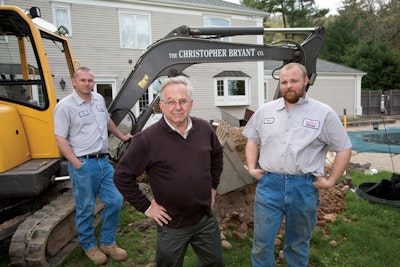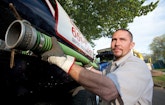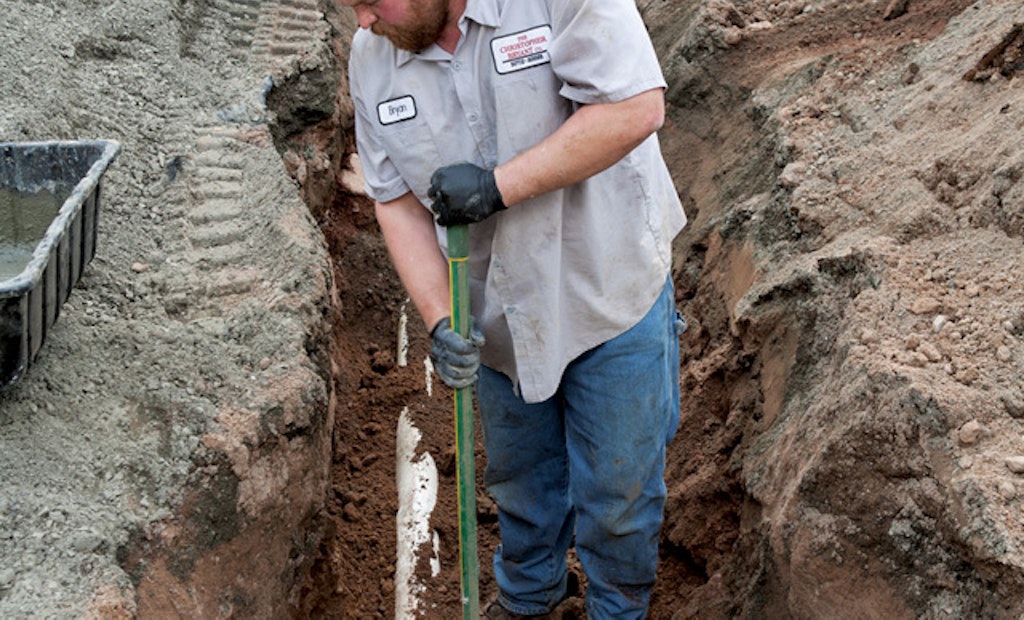Interested in Onsite Systems?
Get Onsite Systems articles, news and videos right in your inbox! Sign up now.
Onsite Systems + Get AlertsInnovation requires risk, and risk can be scary. Yet seldom is it possible to take a business to new heights without adapting and responding to change. David Litchfield, general manager of The Christopher Bryant Co. in Simsbury, Conn., has taken some calculated risks during his 38-year career and been rewarded for them – notably, the one that led him into the septic service business.
Today, Litchfield operates a thriving family business that includes septic service in addition to onsite installations, inspections and repairs (another division is dedicated to construction: David Litchfield Building and Remodeling). With the business, Litchfield has created a nest egg and legacy for his five children, two of whom work with him every day (and serve as the company’s namesakes).
Now, the company is preparing for change yet again. Litchfield is poised to take advantage of an improving economy with the addition of a new, 5,100-gallon vacuum truck to his fleet, and he is also hiring new staff – namely, a new position dedicated to sales.
SWITCHING GEARS
Small business owners know you take the good with the bad, and a bad economy is often an impetus for change. Such was the case in 1980. The economy was tanking, and after seven years as a builder and carpenter, Litchfield was looking to diversify to supplement income lost to the hemorrhaging construction market. One day he was talking to a bulldozer operator about the prospect for more varied work.
“The more we talked,” Litchfield says, “the more we said this economy is dying. What skills did we have that we could put to use with this equipment? The answer was (installing) septic systems.”
Litchfield says he found the septic side intriguing, having installed a few systems previously. And, very little investment was necessary as he already owned the needed equipment.
The new service was marketed alongside the company’s building services. Initial traction came with a concentration on personal service. Christopher Bryant offered more “hand-holding” for homeowners than general excavators could, with someone always answering the phone and at-the-ready to answer questions. At the same time, an abundance of area homes built in the 1950s and 1960s were getting to the age that they needed their septic tanks replaced, so demand was high.
It was almost another 20 years before Litchfield branched into septic pumping. Over that time, the company offered the service, but subcontracted it to other pumpers. In 1998, he decided that to truly be a full-service company, he had to buy a vacuum truck and enter the market. And he did just that – pumping and inspections now account for 60 percent of the company’s $2.4 million in annual sales.
In 2011, Litchfield took delivery of his third vacuum truck, a 2012 Volvo with automatic transmission, built out by Com Vac Systems, with a 5,100-gallon waste/100-gallon freshwater aluminum tank and Jurop PR 200 liquid-cooled 700 cfm pump. He adds this to his current fleet: a 1999 International with a 2,500-gallon steel tank and 360 Challenger pump, built out by Lely Manufacturing Inc.; a 2002 Volvo truck with a 4,500-gallon steel tank, Utile fan-cooled 400 cfm LW625 pump that has been updated by Com Vac Systems; and two Ford E-250 service trucks.
On the excavating side, equipment includes a 2007 Volvo tri-axle dump truck; 1986 International dump truck; Case backhoe, bulldozer and skid-steer; John Deere excavator; Kobelco excavator; and Bobcat skid-steer.
A FAMILY COMPANY
The ownership arrangement of The Christopher Bryant Co. could best be described as “all in the family.” Litchfield’s five children each own 20 percent of the business – yet each is involved differently. Christopher, 31, and Bryan, 29, the company’s namesakes, are both integral to day-to-day operations. The eldest girls, Shanan, 27, and Kylee, 25, are both in college working toward advanced degrees. And the youngest, Taylor, 16, attends high school.
Chris, who is an installer, and Bryan, a driver, are among the company’s 12 employees: six on the septic side and five on the building/remodeling side (Litchfield oversees both.)
Litchfield understands the ownership arrangement is unique, but that it works for his family. “Having the ownership the way it is solves the problem many small businesses wrestle with – succession,” he says. At least for now.
“They’ll have about a generation to worry about it,” Litchfield says. “If they stay with it they’ll have until they’re 60 before they have a problem.”
And while he admits there is the potential for sibling squabbles, he doesn’t foresee that for his children. “I hope and think we’re probably not going to see that kind of thing,” he says.
The children are all members of the limited liability corporation and have been since joining the family. The level of ownership shifted with the birth of each child.
The boys bring complementary skills to the company and are paid a fair hourly wage, Litchfield explains. Much of the profit is reinvested back into the business. The girls are essentially passive owners, but the siblings communicate via regular emails and meet at least once a year to air issues and discuss the future. They also meet once a year with the company’s accountant.
Organic growth and reinvestment into the business have allowed the company to carry little debt.
Litchfield contributes as general manager, and is heavily involved in the company’s marketing. Now 59, he plans to stick around at least a few more years – although his sons are prepared to take over.
“Frankly, I think they can run it now with very little oversight. Right now, I’m adding the marketing element they’ll be able to take on. We’re getting the systems in place to acquire a company, or to be acquired,” he adds. “I don’t know that we’re there yet.”
MARKETING MATTERS
Litchfield and the company’s employees subscribe to a specific core value: customer focus – concierge service. But customer service and a solid reputation only go so far; consistent, strategic marketing is the key to drumming up new business, as far as Litchfield is concerned.
“We market extremely hard,” Litchfield says. “We advertise full out through the year where others lay off in the winter – and we’re able to stay busy.”
Among its more traditional marketing methods is direct mail; postcards continue to bring in nearly a quarter of the company’s new customers. But, it’s not always about what the postcards say, it’s what they show.
Both the company’s website and its most recent postcard promotion feature pictures of the Litchfield boys, as adults and when they were children. This tactic has proved more successful than Litchfield ever anticipated.
“I think seeing people is an important thing,” Litchfield says. “It’s comforting to see the face of someone – and you won’t be afraid of them being in your backyard,” he explains.
The boys’ pictures made fans beyond the customer base. “A lady called one day who doesn’t own a septic system, but said she wanted to have one put in because she loves the pictures of the boys. The fact she took the time to call really reinforced that the ad had worked.”
Referrals and advertising also rank among the most popular ways new customers come in.
Giving customers access to a friendly voice whenever they call is key to Litchfield’s service philosophy. The company’s phones are answered from 5:30 a.m. to 7 p.m. daily, and on an emergency basis nights and weekends. Litchfield maintains it’s just as important to have good people in the office as it is in the field. “When (customers) call and get someone who really cares, it really does make a big difference.”
READY FOR RECOVERY
With the business having skirted much of the fallout of the economic downturn (the company was up about 7 percent in 2011 over 2010), Litchfield is confident a turnaround – especially in the housing market – will happen sooner than later, and that his company will be ready to take advantage of the recovery.
He uses the first quarter of 2011 as an example. “It was amazing the uptick we had, and that was from the stimulus package. We were 30 percent ahead on almost everything across the board,” he says. “I think we need to be positioned so that when (the recovery) does happen, we can take advantage of it.”
And Litchfield is optimistic: “Our intent is that by 2014, our pumping will have grown by about a 35-50 percent margin from where it is now,” he says. Heavy marketing, and having the right people in place – and at the right times – will fuel that growth, he says.
The company is seeking a salesperson – someone on the road to call on accounts. With the acquisition of the bigger service truck, Litchfield says the company is prepared to pursue larger accounts, stretching beyond its current customer base, which is 95 percent residential, and into more commercial work.
Litchfield’s plans call for an additional $350,000 in commercial volume due to the new truck, but he has no intention of losing sight of the bread-and-butter residential customers. This time, it will be Litchfield’s sons – who seem to have inherited their father’s same dedication to customer service – who will lead the business to new levels of success.
“Chris and Bryan are much more than the faces of the company, they are the reason customers stay with us throughout the years,” Litchfield adds. “The careful consideration they show in completing each job, from start to finish, leaves the customers satisfied and at ease.”









